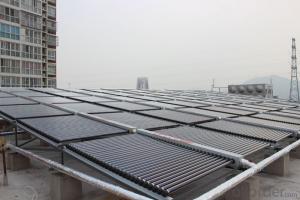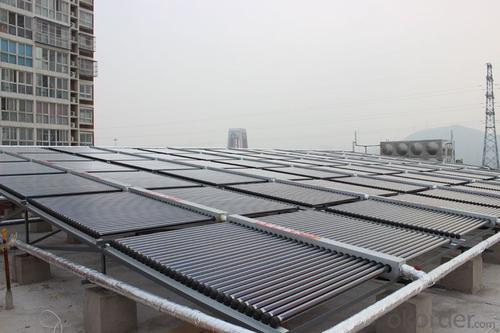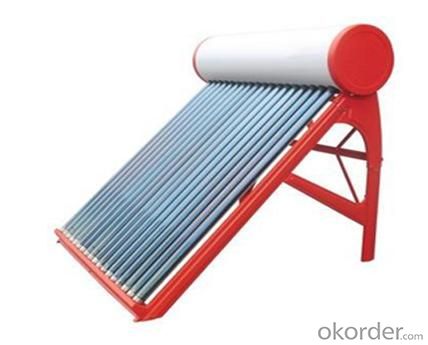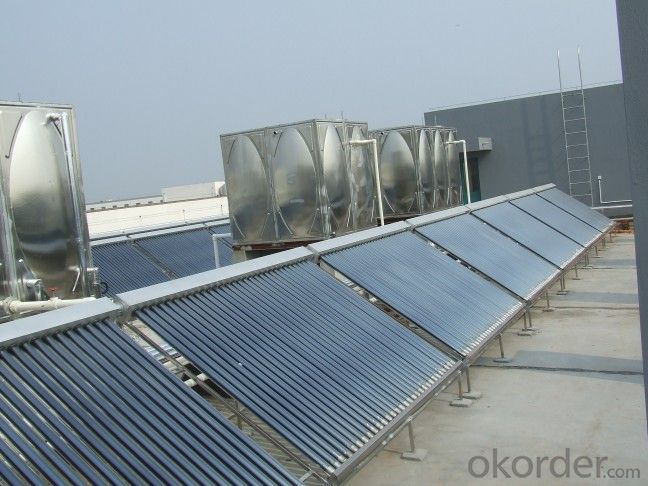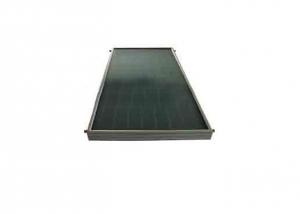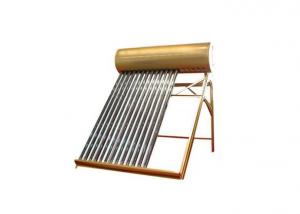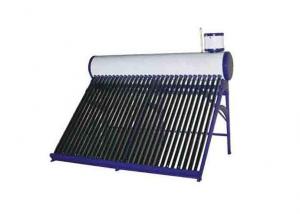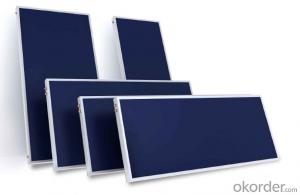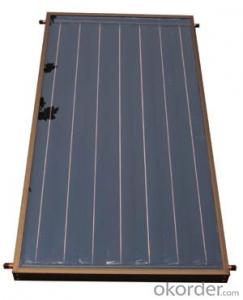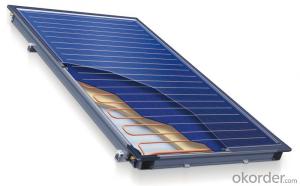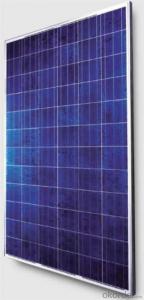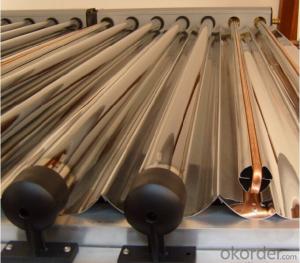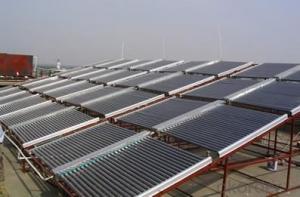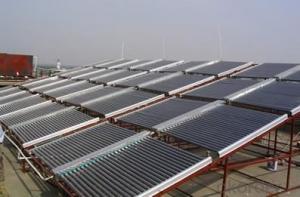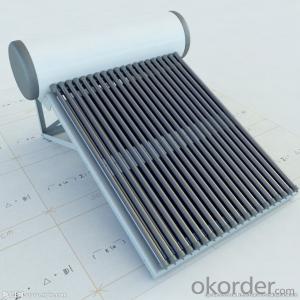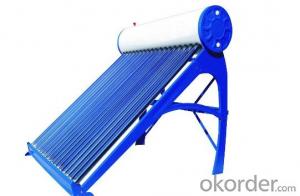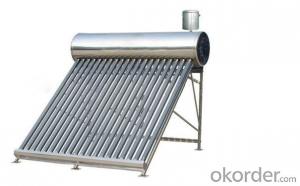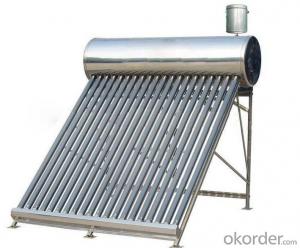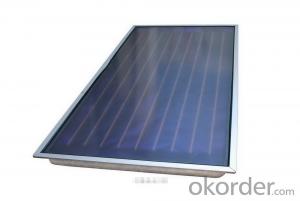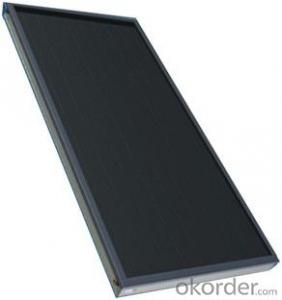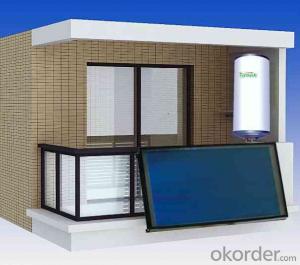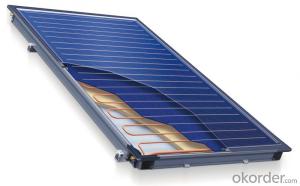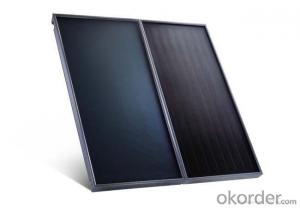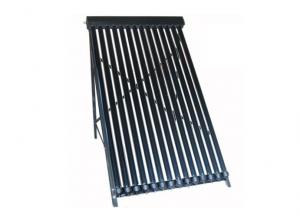Solene Solar Collectors Non-Pressurized Heat Pipe Solar Water Heater System New Designed
- Loading Port:
- China main port
- Payment Terms:
- TT OR LC
- Min Order Qty:
- 1 set
- Supply Capability:
- 6000 set/month
OKorder Service Pledge
OKorder Financial Service
You Might Also Like
Introduction of Non-Pressure Solar Water Heater:
Non-pressure Solar Heater is one of the most economical solar water heating device with pretty high efficiency at the same time. It consists of hot water storage tank, solar vacuum tubes with mouth plug in storage tank, and bracket supporting tank and tubes.When cold water in evacuated tubes is heated with solar irradiation, as the specific gravities of hot water and cold water are different, hotter water goes upward to storage tank and colder water goes downward to glass tubes. through this continuous circulation, the cold water in storage tank will be gradually heated till sunset.
Specialty:
1. High thermal performance and working temperature: the heat exchanging rate even in winter can up above 55%.
2. Heat collecting efficiency is at least 20% above common solar systems.
3. Work in all day and all season: no matter any corner of the world, this system can work well even -40℃ to avoid the tube freezing problem.
4. Reliability: No water following through the tube, so water scale can not generate and tube cracks could be avoided, the system still can keep working even with some damaged tubes.
5. It can connect with water tap and work automatically with pressure0.6Mpa, bring enjoyable washing experience.
6. Safety: P/T valve would release pressure and temperature to protect tank..
Technical Specification:
1. Outer tank material: SUS304 stainless steel or powder coated color steel
2. Inner tank material: 1.2mm thick SUS304 food grade stainless steel ( Optional material SUS316L)
3. Vacuum tube material: borosilicate glass 3.3; AL-SS-CU absorb coating, with copper heat pipe inside
4. Frame material: 1.2mm thickness stainless steel
5. Insulation material: 55mm thickness polyurethane
6. Suitable for mains pressure water(up to 8 bar/116psi)
7. Easy plug-in installation
8. Install the T/P valve on the pressurized tank
9. Seal material: Stabilized High Temperature Silicon
Outer tank material: SUS304 stainless steel or powder coated color steel
Inner tank material: 1.2mm thick SUS304 food grade stainless steel ( Optional material SUS316L)
Vacuum tube material: borosilicate glass 3.3; AL-SS-CU absorb coating, with copper heat pipe inside
Frame material: 1.2mm thickness stainless steel
Insulation material: 55mm thickness polyurethane
Suitable for mains pressure water(up to 8 bar/116psi)
Easy plug-in installation
Install the T/P valve on the pressurized tank
Seal material: Stabilized High Temperature Silicon
19. Vacuum Tube | 20. Size (mm) | 21. Φ47*1500 / Φ58*1800 / Φ70*2100 | |||||
22. Tube (pcs) | 23. 10 / 12 / 15 / 18 / 20 / 22 / 24 / 30 / 36 / 42 | ||||||
24. Material | 25. Borosilicate 3.3 glass, magnetron spluttering selective coating | ||||||
26. Coating | 27. Single-target AL-N/AL or Three-target AL/N-Cu-SS | ||||||
28. Water Tank | 29. Capacity | 30. 80L ~ 500L for hot water storage tank | |||||
31. Inner tank | 32. Food-grade stainless steel SUS304-2B / SUS316 | ||||||
33. Insulation | 34. High-density polyurethane foam with 70~80 hour heat preservation | ||||||
35. Tank shell | 36. Food-grade stainless steel SUS304-2B | ||||||
37. Bracket | 38. Shaped strong aluminum alloy structure adaptable for flat or slope roof | ||||||
39. Accessories | 40. Anti-aging silicon seals, Dustproof seals, Air-vent cap, Stainless screws | ||||||
41. Auxiliary Devices | 42. Assistant tank, Intelligent controller, Electrical heater, Magnesium anodes | ||||||
43. Tilt Angle | 44. 25 ~ 50° | ||||||
45. Water Output | 46. 45 - 95°C | ||||||
47. Hail Resistance | 48. Φ25mm diameter | ||||||
49. Model Number | 50. Solar Vacuum Tube | 51. Tank 52. Liter | 53. System 54. Liter | 55. Container Loading Qty /sets | |||
56. Size /mm | 57. Qty /pcs | 58. 20GP | 59. 40GP | 60. 40HQ | |||
61. VNS-58SA12-100 | 62. Φ58*1800 | 63. 12 | 64. 100 | 65. 132 | 66. 58 | 67. 119 | 68. 140 |
69. VNS-58SA15-130 | 70. 15 | 71. 130 | 72. 170 | 73. 54 | 74. 108 | 75. 131 | |
76. VNS-58SA18-150 | 77. 18 | 78. 150 | 79. 198 | 80. 43 | 81. 86 | 82. 105 | |
83. VNS-58SA20-170 | 84. 20 | 85. 170 | 86. 223 | 87. 40 | 88. 80 | 89. 97 | |
VNS-58SA24-200 | 24 | 200 | 263 | 35 | 70 | 85 | |
VNS-58SA30-250 | 30 | 250 | 329 | 28 | 56 | 68 | |
VNS-58SA36-300 | 36 | 300 | 395 | 23 | 47 | 57 | |
Product Show
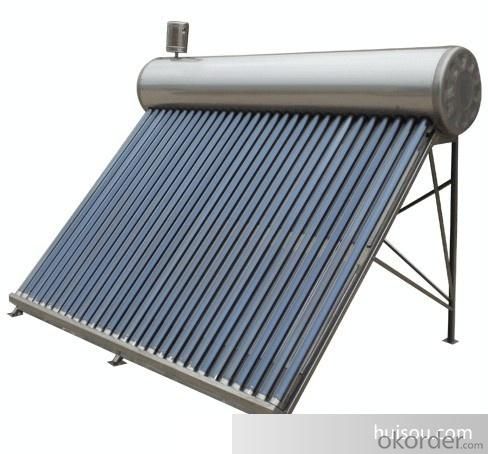
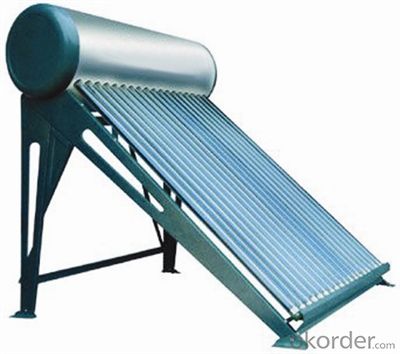
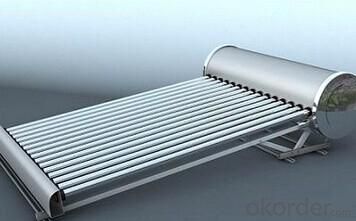
Our Services
1. OEM service
2. Warranty: 5 years
3. Considerable after sale service
Color steel Compact pressure Thermal solar heater
FAQ:
1. What’s the delivery time?
10 days after receiving deposit.
2. How long is the warranty?
5 years for whole system, 1 year for accessory
3. What’s your production capacity?
6000sets/month
4. What’s the MOQ?
1 set.
5. What’s your payment term?
Container: 30% T/T in advance for deposit, 70% T/T before shipment for fist order.
70% T/T after seeing copy of B/L from second order
Sample: 100% T/T in advance
Other choices: L/C at sight.
6. What certifications do you have?
CE, SOLAR KEYMARK, SRCC and etc.
- Q: Can solar collectors be used for heating car rental facilities and parking lots?
- Yes, solar collectors can be used for heating car rental facilities and parking lots. Solar collectors, also known as solar thermal systems, capture heat from the sun and convert it into usable thermal energy. This energy can be used for various purposes, including heating buildings and providing hot water. In the case of car rental facilities and parking lots, solar collectors can be installed on the rooftops or adjacent to the buildings to harness solar energy. This energy can then be used to heat the interior spaces of the rental facilities, such as office areas and waiting rooms, ensuring a comfortable environment for customers and staff. Additionally, solar collectors can be integrated into the parking lot infrastructure, providing heating for the pavement during cold weather conditions, which can help prevent ice formation and ensure safer driving conditions. By utilizing solar collectors for heating car rental facilities and parking lots, businesses can significantly reduce their reliance on traditional heating systems that are powered by fossil fuels. This not only helps to reduce greenhouse gas emissions and combat climate change but also leads to cost savings in the long run by reducing energy consumption and dependence on non-renewable resources. Furthermore, solar collectors require minimal maintenance and have a long lifespan, making them a sustainable and reliable heating solution for car rental facilities and parking lots.
- Q: How do solar collectors perform in coastal areas?
- Solar collectors perform well in coastal areas due to the abundant sunshine and the cooling effect of the ocean breeze, which helps to enhance their efficiency.
- Q: Are there any aesthetic considerations with solar collectors?
- Yes, there are aesthetic considerations with solar collectors. Many people are concerned about the visual impact of solar panels on the appearance of their homes or buildings. However, manufacturers have made efforts to design solar panels that blend in with the architecture or surroundings, offering more aesthetically pleasing options. Additionally, some innovative solar technologies, such as solar roof tiles or transparent solar windows, aim to integrate solar power generation seamlessly into building designs, addressing aesthetic concerns.
- Q: Can solar collectors be used for heating tourist attractions and theme parks?
- Yes, solar collectors can be effectively used for heating tourist attractions and theme parks. Solar thermal collectors are capable of harnessing the sun's energy to heat water or air, which can then be used for space heating or hot water needs in these establishments. Implementing solar collectors not only reduces reliance on fossil fuels but also provides a sustainable and environmentally friendly solution for meeting heating requirements in tourist attractions and theme parks.
- Q: Can solar collectors be used in areas with high wind speeds?
- Yes, solar collectors can be used in areas with high wind speeds. However, it is important to consider the design and installation of the collectors to ensure their stability and functionality in such conditions.
- Q: Can solar collectors be used for drying crops?
- Yes, solar collectors can be used for drying crops. Solar collectors can convert sunlight into heat energy, which can be utilized for the purpose of drying agricultural products. The collected solar energy can be used to generate hot air or heat sources, which can then be directed towards the crops, aiding in the drying process and reducing moisture content. This method of solar drying can be cost-effective, environmentally friendly, and efficient for farmers and communities looking to preserve crops and extend their shelf life.
- Q: What is the impact of humidity on the performance of solar collectors?
- The performance of solar collectors can be influenced by humidity in both positive and negative ways. On one hand, higher levels of humidity can be beneficial as they assist in preventing the accumulation of dust and dirt on the surface of the collectors. This, in turn, enhances their efficiency by acting as a natural cleaner, eliminating particles that could obstruct sunlight and diminish energy conversion into electricity or heat. Nevertheless, excessive humidity can also result in condensation forming on the collectors' surface. This condensation acts as a barrier that obstructs the absorption of solar radiation, thereby diminishing the overall performance of the collectors. Furthermore, it can cause the formation of water droplets, leading to corrosion and potential long-term damage, thus reducing the collectors' lifespan. Moreover, elevated humidity levels can foster the growth of mold, algae, and other organic matter on the collectors' surface. This buildup of organic matter further obstructs sunlight, reducing the efficiency of the collectors and necessitating more frequent cleaning and maintenance. In conclusion, while moderate humidity levels are advantageous in maintaining clean solar collectors, excessive humidity can result in condensation, corrosion, and the growth of organic matter, ultimately diminishing their performance. To ensure optimal performance and longevity in humid environments, regular maintenance and cleaning are indispensable.
- Q: Are there any architectural considerations when installing solar collectors?
- Yes, there are several architectural considerations when installing solar collectors. Firstly, the orientation and tilt of the collectors should be carefully planned to maximize solar exposure and energy generation. Ideally, they should face south in the Northern Hemisphere and north in the Southern Hemisphere to capture the most sunlight throughout the day. Secondly, the size and placement of solar collectors should be taken into account to ensure they do not obstruct the architectural design or compromise the structural integrity of the building. The weight of the collectors and the additional load they impose on the roof or building structure must be carefully evaluated. Thirdly, the visual impact of solar collectors on the building's aesthetics should be considered. Depending on the architectural style and design, it may be necessary to integrate the collectors seamlessly into the building's facade or roof to maintain its visual appeal. Additionally, architectural considerations related to shading and shadowing must be taken into account. Nearby structures, trees, or other obstructions should be assessed to minimize any potential shading that could reduce solar energy production. Lastly, the electrical infrastructure and wiring required for connecting the solar collectors to the building's electrical system should be planned and integrated into the architectural design. This may involve routing cables or conduits in a way that minimizes their visibility and impact on the building's interior or exterior appearance. Overall, architects and designers need to work closely with solar experts to ensure that the installation of solar collectors aligns with the architectural vision, structural requirements, and energy goals of the building.
- Q: Can solar collectors be used for heating cinemas?
- Yes, solar collectors can be used for heating cinemas. Solar thermal systems can capture the sun's energy and convert it into heat, which can be utilized for heating purposes in buildings. By installing solar collectors on the rooftop or nearby areas of a cinema, the collected solar energy can be used to heat the building, including the cinema halls. This can help reduce the reliance on traditional heating systems, decrease energy costs, and contribute to a cleaner and more sustainable energy source for heating cinemas.
- Q: What is the cost of installing a solar collector?
- The cost of installing a solar collector can vary depending on various factors such as the size of the collector, the complexity of the installation, and the region where it is being installed. On average, the cost can range from several thousand dollars to tens of thousands of dollars. It is recommended to consult with a solar installation professional to get an accurate estimate based on your specific needs and circumstances.
Send your message to us
Solene Solar Collectors Non-Pressurized Heat Pipe Solar Water Heater System New Designed
- Loading Port:
- China main port
- Payment Terms:
- TT OR LC
- Min Order Qty:
- 1 set
- Supply Capability:
- 6000 set/month
OKorder Service Pledge
OKorder Financial Service
Similar products
Hot products
Hot Searches
Related keywords
